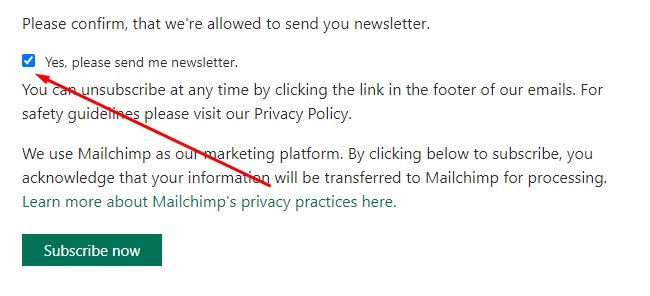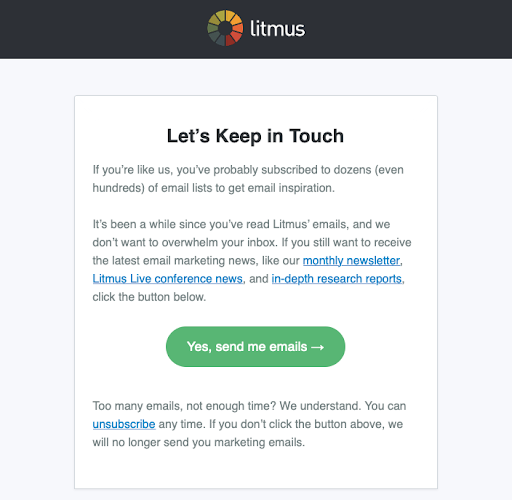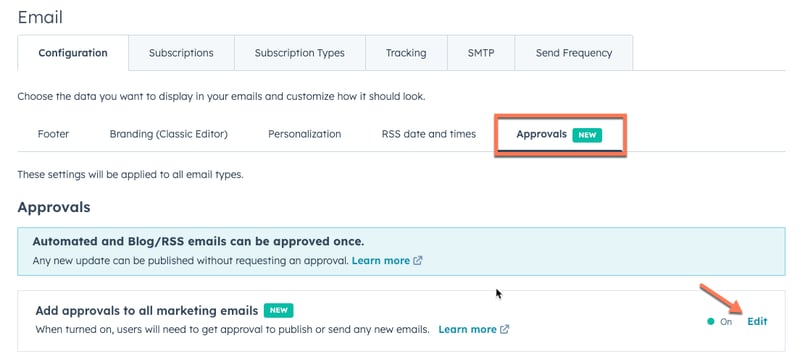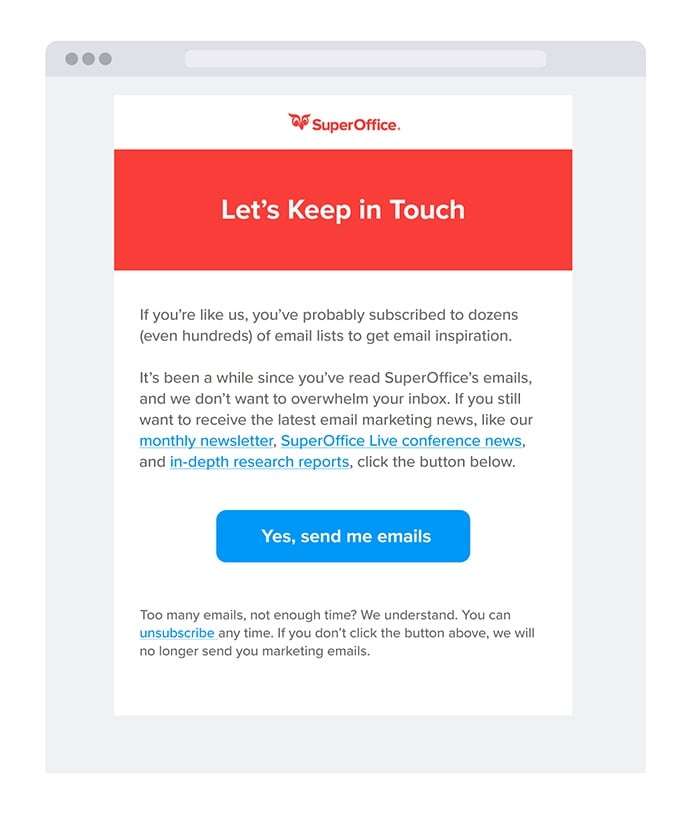No, you cannot send a marketing email without permission. It is illegal and unethical.
Sending emails without consent can harm your reputation. It can also lead to fines. Businesses need to follow email marketing laws. These laws protect consumers from spam. In this blog post, we will discuss the importance of permission in email marketing.
We’ll explore the risks of sending unsolicited emails. And, we’ll share tips for building a permission-based email list. This will help you stay compliant and build trust with your audience. Understanding these rules is crucial for successful email marketing. So, let’s dive in and learn more about the right way to send marketing emails.

Credit: www.termsfeed.com
Legal Framework
Sending marketing emails without permission can lead to legal consequences. Understanding the legal framework is crucial. Different countries have their own regulations. These laws protect consumers from unwanted emails. Let’s dive into the key aspects of these regulations.
Regulations And Laws
Many countries have strict rules about marketing emails. The CAN-SPAM Act in the USA is one example. It requires clear opt-out options. Violating this can result in heavy fines. The GDPR in Europe is another key regulation. It demands explicit consent before sending emails. Fines for non-compliance can be severe. Canada’s CASL is also notable. It requires consent and accurate sender information.
Jurisdiction Differences
Legal requirements vary by country. In the USA, opt-out is mandatory. In Europe, opt-in is required. Canada has its own rules. Each jurisdiction enforces its laws differently. Understanding these differences is crucial. It helps avoid legal trouble. Always check local regulations before sending emails. Respecting these laws builds trust with recipients.

Credit: www.litmus.com
Consent Requirements
Sending marketing emails without consent can lead to serious consequences. Understanding the consent requirements is crucial. You must know the difference between explicit and implicit consent. Learn how to obtain consent effectively.
Explicit Vs. Implicit Consent
Explicit consent is clear and direct. The recipient gives a clear “yes” to receive your emails. This can be through a checked box or a subscription form.
Implicit consent is indirect. It is based on the recipient’s actions. For example, a customer buying a product may imply they are open to receiving emails. However, explicit consent is always safer.
How To Obtain Consent
Obtaining consent is simple with the right approach. Here are some methods:
- Subscription Forms: Place forms on your website. Make sure they are easy to find and fill out.
- Check Boxes: Use check boxes during account creation. Ensure they are unchecked by default.
- Double Opt-In: Send a confirmation email. Ask the user to confirm their subscription.
Remember, clearly state what the user is signing up for. Transparency builds trust.
Penalties For Non-compliance
Sending marketing emails without permission can lead to severe penalties. These penalties can affect your business in multiple ways. Let’s explore the consequences in detail.
Fines And Legal Actions
Non-compliance with email marketing laws can result in hefty fines. Authorities like the Federal Trade Commission (FTC) enforce these laws. Businesses can face fines up to $43,792 per email. Legal actions can also be taken against the offenders. This can include lawsuits and court cases. Legal battles can be costly and time-consuming.
Reputation Damage
Sending unsolicited emails can harm your business reputation. Customers may view your emails as spam. This can lead to a loss of trust. Bad reviews can spread quickly on social media. Your brand’s image can suffer as a result. Trust is hard to rebuild once lost.
Remember, penalties for non-compliance are severe. Fines, legal actions, and reputation damage are real risks. Always seek permission before sending marketing emails. Protect your business and maintain customer trust.

Credit: knowledge.hubspot.com
Exceptions And Exemptions
Sending marketing emails without permission can lead to legal trouble. But there are exceptions and exemptions that allow you to send emails in certain situations. Understanding these exceptions can help you stay compliant and avoid penalties.
Transactional Emails
Transactional emails are an exception to the rule. These emails are necessary for business operations and do not require permission. Examples include:
- Order confirmations
- Shipping notifications
- Password reset emails
These emails provide essential information to the recipient. They are not considered spam because they facilitate a transaction.
Existing Customer Relationships
You may email customers with whom you have an existing relationship. This is another key exception. If someone has bought from you or used your services, you can send them marketing emails. This is because they have shown interest in your business.
But it’s important to follow these guidelines:
- Ensure the emails are relevant to the customer’s interests.
- Include an easy way to unsubscribe.
- Respect the customer’s preferences.
Maintaining a good relationship with your customers is essential. Sending relevant emails can strengthen this bond.
Best Practices
Sending marketing emails without permission can lead to serious consequences. To avoid issues, follow the best practices. These guidelines help ensure compliance and maintain your business’s reputation.
Crafting A Compliant Email
When creating a marketing email, it’s crucial to adhere to legal standards. Here are some key points to consider:
- Clear Subject Lines: Ensure your subject line is not misleading. It must reflect the email’s content accurately.
- Identify Yourself: Your email should clearly state who you are and provide your business’s contact information.
- Unsubscribe Option: Always include an easy way for recipients to opt-out of future emails. Make this process straightforward and immediate.
- Relevant Content: Tailor your email content to the interests of your audience. This increases engagement and reduces spam complaints.
Managing Email Lists
Properly managing your email lists is essential for compliance and effectiveness. Follow these best practices:
- Obtain Consent: Always get explicit permission from recipients before adding them to your email list. This can be through a sign-up form or a checkbox during registration.
- Segment Your Lists: Group your contacts based on their interests and behavior. This helps in sending targeted and relevant emails.
- Regularly Clean Your List: Remove inactive subscribers and invalid email addresses. This improves your email deliverability and engagement rates.
- Monitor Engagement: Keep track of how recipients interact with your emails. Adjust your strategies based on open rates, click rates, and other metrics.
By following these best practices, you ensure your marketing emails are compliant and effective. Remember, respecting your audience’s preferences leads to better relationships and results.
Opt-out Mechanisms
Understanding opt-out mechanisms is crucial for email marketing. These mechanisms help recipients unsubscribe from emails they no longer wish to receive. This ensures compliance and maintains a good sender reputation. It also respects the recipient’s choices.
Unsubscribe Links
Unsubscribe links are mandatory in marketing emails. They allow recipients to opt out of future emails. These links should be easy to find. Usually, they are placed at the bottom of the email. Clicking the link should lead to an immediate unsubscribe process. No extra steps.
Make the process quick and simple. This reduces frustration. It also ensures compliance with email regulations. Always test your unsubscribe links. Ensure they work properly. This shows respect for your audience’s preferences.
Preference Centers
Preference centers offer more flexibility than simple unsubscribe links. They let recipients choose the types of emails they want. This can include promotional emails, newsletters, or updates. Offering these options can reduce the number of full unsubscribes.
Preference centers should be easy to use. Provide clear options. Allow recipients to update their preferences at any time. This helps maintain engagement with your audience. It also shows that you respect their preferences.
Regularly review your preference center settings. Ensure they are up to date. This helps keep your email list clean. It also improves your email deliverability rates.
Global Perspectives
Understanding the global perspectives on email marketing regulations is crucial. Different regions have distinct rules about sending marketing emails without permission. This section discusses the main regulations in Europe and the USA.
Gdpr In Europe
The General Data Protection Regulation (GDPR) governs email marketing in Europe. It requires businesses to get explicit consent before sending marketing emails.
Key points of GDPR include:
- Explicit consent: Users must opt-in willingly.
- Data protection: Personal data must be secured.
- Transparency: Users should know how their data will be used.
Failing to comply can result in heavy fines. Businesses must ensure they have clear consent records.
Can-spam In The Usa
The CAN-SPAM Act regulates email marketing in the USA. Unlike GDPR, CAN-SPAM allows sending marketing emails without prior consent. But, there are strict rules to follow.
Key points of CAN-SPAM include:
- Accurate header information: The sender and domain name must be correct.
- Clear subject lines: The subject should reflect the email content.
- Unsubscribe option: Every email must offer an easy way to opt-out.
Violations of CAN-SPAM can result in significant penalties. Businesses must provide a visible and functional unsubscribe link.
| Regulation | Region | Consent Required | Key Requirements | Penalties |
|---|---|---|---|---|
| GDPR | Europe | Yes | Explicit consent, data protection, transparency | Heavy fines |
| CAN-SPAM | USA | No | Accurate headers, clear subject lines, unsubscribe option | Significant penalties |
Future Trends
The landscape of email marketing is constantly evolving. Future trends point towards stricter regulations and advanced technological solutions. Understanding these changes can help businesses navigate the complex world of email marketing.
Evolving Regulations
Governments are tightening laws around email marketing. New regulations focus on protecting user privacy and data. Businesses must stay informed about these changes. Ignorance can lead to hefty fines and legal troubles.
The General Data Protection Regulation (GDPR) in Europe is one example. It emphasizes consent and transparency. Companies must ensure they have permission before sending emails. Similar laws are emerging worldwide.
Adapting to these regulations is crucial. It builds trust with your audience. Compliance also helps maintain a positive brand image.
Technological Solutions
Technology is also transforming email marketing. Advanced tools can help manage consent and compliance. Email automation software tracks permissions and unsubscribes. This ensures only those who opted in receive your emails.
Artificial Intelligence (AI) is another trend. AI can personalize email content based on user behavior. It improves engagement and reduces spam complaints. Investing in such technologies can enhance your email marketing strategy.
Future trends in email marketing emphasize compliance and technology. Staying updated can help you send effective and legal marketing emails.
Frequently Asked Questions
Is It Legal To Send Marketing Emails Without Permission?
No, it’s not legal. Sending marketing emails without permission can violate laws like GDPR and CAN-SPAM Act. Always get explicit consent.
What Happens If I Send Emails Without Consent?
Sending emails without consent can result in fines and damage to your reputation. It’s also likely to increase spam complaints.
How Can I Get Permission To Send Marketing Emails?
You can get permission through opt-in forms on your website, during checkout, or through a sign-up incentive.
Are There Exceptions To Email Permission Laws?
Yes, transactional emails and emails to existing customers can be exceptions. However, always check specific regulations in your region.
Conclusion
Respecting privacy and permission is crucial in email marketing. Always ask for consent. This builds trust with your audience. Trust leads to better engagement. Unsolicited emails can damage your brand’s reputation. They can also lead to legal issues. So, prioritize permission.
It’s the best practice for successful marketing. Keep your strategies ethical. Your audience will appreciate it. This approach ensures long-term success. Remember, respect and consent matter. Make them a cornerstone of your email marketing. Your brand will thrive with this principle.



Leave a Reply